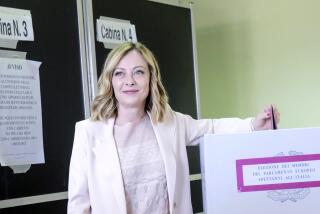Serbs Left Off Rolls as Croatia Chief Heads for Win
- Share via
VUKOVAR, Croatia — The man who until recently was the mayor of this Serb-held city could not find his name on the voter registration list Sunday when he went to cast his ballot for president of Croatia.
Nor could hundreds of other Serbs trying to vote in an election that appeared certain to return Croat nationalist leader Franjo Tudjman to the presidency.
The first returns showed Tudjman, 75 and said to be dying of cancer, with 59% of the vote, state officials said early today, well ahead of the 50% needed to avoid a runoff. Fireworks lighted the sky in Zagreb, the capital, and a smiling Tudjman told state television that his victory will allow Croatia to make the final move from war to peace and economic progress.
Here in the chunk of Croatia known as Eastern Slavonia, seized by militant Serbs in a 1991 war with Croatian forces but soon to be restored to Croatian rule, few people were interested in voting. And many who were couldn’t.
“I don’t know whether it was inattention or malice,” said a senior Western diplomat who was monitoring the vote. But irregularities again highlighted the obstacles Croatian authorities are placing in the path of Serbs who want to remain in Croatia.
Voter registration lists were to be updated by Croatian authorities--under the supervision of U.N. officials who administer the disputed region--based on local elections two months ago. The names of at least 11,000 people, almost all Serbs, were to be added to the registration lists, U.N. officials said.
But in numerous polling stations across the fertile plains of Eastern Slavonia, the lists of mostly Serbian voters actually contained fewer names than in April.
“Some people were denied the right to vote,” international election monitor Barbara Davis said. In the end, the numbers were small, she noted, because the overall turnout was so low.
In four precincts in the Vukovar suburb of Borova Naselje, more than 3,000 people were listed as eligible voters in April; on Sunday, only 2,119 names appeared. By midday, 109 people who showed up to vote were blocked because their names were missing; 268 others were able to vote.
Many of the disenfranchised were elderly Serbs who have lived in the area all their lives, said Vlado Grbic, a 50-year resident of Vukovar. And Miroslav Keravica, the mayor of Vukovar until last month, and his wife were not allowed to vote because their names were not on the list.
The names of most of the residents of one street--renamed Serbian Unity Street by the Serbs--had also vanished from the registry. Similar irregularities involving about 2,000 aspiring voters were reported by U.N. officials in Ilok, Borovo and Opatovac.
The fact that Serbs were prevented from casting ballots in the presidential contest, however, will not change the outcome. In April, turnout was huge because local leadership was at stake. But in Sunday’s race, Tudjman was considered a shoo-in, and the two other candidates were Croats who advocated more democracy but did not show special interest in the problems of minority Serbs.
“I think so few people are voting because none of the candidates assured anything for the Serbs,” one Serbian poll worker, Andjeliko Novakovic, told a visiting delegation of American monitors in the town of Tenja. “There is no security for the Serbs.”
As Eastern Slavonia is gradually re-integrated into Croatia, the autocratic Tudjman is coming under growing U.S. pressure to guarantee the safety and rights of Serbs who want to remain, as well as of those who live in Eastern Slavonia but want to return to the homes elsewhere in Croatia from which they were expelled.
A few miles from Vukovar, in the Croat-controlled city of Osijek, displaced Croats were voting for president in higher numbers. At one polling station, black banners and other decorations pleaded for information on missing Croats. “Where are our loved ones?” asked an embroidered needlework sampler on the wall.
“I hope I’ll be able to go home, but it’s been too long--six years,” said Croatian poll worker Jurica Cerina, 23. “I will only go if the Croatian authorities are in place--government, police, schools. I don’t feel safe.” His house in Serb-held Sarvas has been badly damaged, he said, with looters having recently removed the roof tiles.
For many Croatian refugees, Tudjman is a freedom-fighting hero who will take his people home. He has capitalized on that sentiment and on fears still fresh after the war, while whipping up a nationalist fervor through strong-arm control of the media. A European Union analysis showed that between May 28 and June 7, Tudjman appeared on the nightly news 33 times, for a total of 4,000 seconds. Rival Vlado Gotovac: seven appearances, 400 seconds. Zdravko Tomac, the third candidate, had one appearance for 16 seconds.
Tudjman’s political fortunes may actually rest far from Eastern Slavonia--in Bosnia-Herzegovina. Under an unusual law, Croatia allows more than 300,000 Bosnian Croats, considered the most hard-line of Croatian nationalists, to vote in its elections. Depending on the size of Sunday’s turnout, the Bosnians may be the voters who give Tudjman the outright victory he expects.
More to Read
Sign up for Essential California
The most important California stories and recommendations in your inbox every morning.
You may occasionally receive promotional content from the Los Angeles Times.











